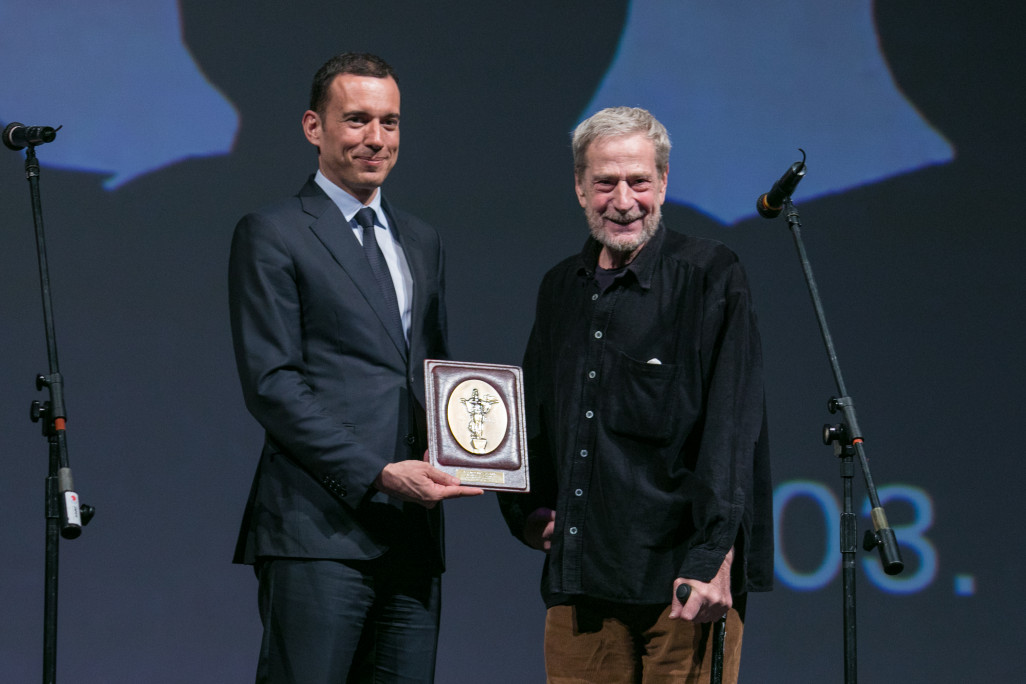Iossif Surchadzhiev is a brilliant actor and director whose talent and charisma have left a lasting imprint on the history of Bulgarian cinema and theater. The 29th Sofia International Film Festival honored the great artist with the Sofia Municipality Award for his exceptional contribution to the art of cinema.
* * *
The Eccentric Iossif Surchadzhiev
Many great actors – such as Anthony Hopkins or Marlon Brando – are primarily associated with their monstrous roles (Hannibal Lecter, or Don Corleone and Colonel Kurtz). Not only for their talent but also for the gracefully layered and repulsively charismatic images they create. In cinematic dramaturgy as well as in theater, negative characters are often the most fascinating.
In Bulgarian cinema from the socialist period, positive heroes were in vogue for practical reasons, and it was the artists who, despite clichés and censorship, managed to portray them as fully rounded, complex characters to be remembered. Perhaps the time has come to pay tribute to those who succeeded not in conveying the oversimplified optimistic spirit of the era, but the complexity of evil. Almost immediately, Iossif Surchadzhiev appears before my eyes in the most representative and ideologically charged historical films – “Aszparuh” and “Time of Violence”.
In “Aszparuh” he portrays Emperor Constantine IV, who is defeated in 680 by the founder of the Bulgarian state. It is a challenging role for Surchadzhiev, yet the actor discovers the key – a blend of haughtiness and eccentricity. His squinting, discerning, and slyly playful eyes suit the role so perfectly that he later employs them in “The Secret of the Devil’s Weapon” (dir. Mariana Evstatieva-Biolcheva) to reinforce the visual concept behind the enduring phrase “cunning Byzantine”.
While his role in “Azsparuh” is a supporting one, in “A Time of Violence” it is central – an embodiment of violence, not only directed at others but also to one’s self. Surchadzhiev’s portrayal of Karaibrahim stands out through the perfectly measured mix of horror and revulsion, along with drama and pain, which he evokes in the viewer. He incarnates the Janissary as an existential and tragic fate – a man without family, without faith, without morals, without ideals, held captive by ambition, hatred, and anger. The ominous scar that cuts across his face, the baleful glare, and the trampling of the bread at a wedding table – these are his demons, and those of all the rootless.
In the spirit of the ’70s and ’80s, Surchadzhiev also embraced romantic roles (“The Black Angels” – as Andro; “Angry Journey” – as Chavdar), dabbled in spy and action thrillers (“Requiem for a Tramp”, “A Middle Aged Slicker”, “Die Only as a Last Resort”, “Typhoons with Gentle Names”, “Bonne Chance, Inspector!”), played with fairy tales in a childlike manner in “The Trip with the Wind”, or even with cars in “The Great Victory”.
Yet his distinctive acting technique is his irony – that detached mockery of his own character. Through it, he created his remarkable stage roles – I need only mention two that I had the pleasure of watching: “Mr. Puntila and His Man Matti” and “Waiting for Godot”, both directed by Leon Daniel. On film, this quality leads him to exotic incarnations in his later appearances in “Fatal Tenderness” and “And God Came Down to See Us”. His irony perhaps even helped him cope with a severe stroke in 2004, after which he shifted to theatrical directing and his on-screen roles diminished considerably.
In recent years, Surchadzhiev has continued with two more films – “January” and “Women Do Cry”. His performance as the Old Man in “January” fits perfectly into the absurd, carnival-like interpretation of Radichkov’s play – stripped of all folk psychology – and here Surchadzhiev is in his element, with the full fluidity of his movements. In “Women Do Cry”, as the Father, he portrays the oppressor and the despised in a feminist world – and the actor is set to have fun with this role. It appears that Surchadzhiev has not only amplified his on-screen eccentricity but has also honed his ability to laugh at himself – and at his audience.
Petia Alexandrova



